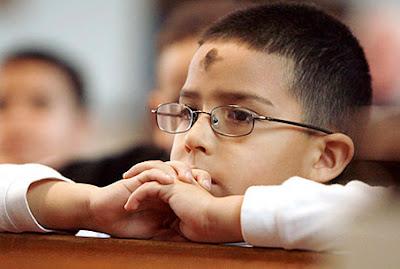TIME TO TAKE A PAUSE AND RETURN.
March 2, 2022
Ash Wednesday.
“Even now, says the Lord, return to me with your whole
heart, with fasting, and weeping, and mourning…” (Joel 2:12)
A Tibetan proverb says: “Traveling is a return to the
essentials.” And a Hungarian proverb adds: “Better to return from halfway than
to take a wrong road.”
Technology has changed considerably since then. Before, when
we were using the tape recorders and radios, to listen to a sound or music
which was passed, one needed to take a pause and then, press on the return or
reverse button. When one missed making the pause and goes straight to the
reverse, there was the great risk of destroying the band through jumping up.
We open today a liturgical season that sounds like a pause
in order to make a return. We are urged to put a pause on our evil tendencies
and make a reverse towards righteousness, a return to God. Lent, says the
teaching of the Church, is a period of 40 days which comes before Easter.
Beginning on Ash Wednesday, it is a season of reflection and preparation before
the celebrations of Easter. By observing the 40 days of Lent, every Christian
replicates Jesus Christ's sacrifice and withdrawal into the desert for 40 days.
We could say in a very basic and simple way that Lent is an
important period of reflection, growth, and new beginnings in our Christian
life and relationship with the Lord and with our fellows. As Christians, it is
a special time given to us to show our devotion to our faith, to examine our
lives, to draw closer to God, and to prepare for the greatest and central event
of our faith, the Resurrection of the Lord. In that sense, Lent is a yearly
journey and opportunity of repentance and conversion. It is, as says the
introduction of the Roman Missal, a two-fold journey of repentance and
reflection on our Baptism. For, it disposes us to relive the paschal mystery.
It is a break given to us to listen more intently to the word of God and devote
ourselves to prayer, a way to re-evaluate and renew our baptismal promises.
Above all, Lent is a time of reflection on sin and virtue.
We are brought to reflect on the social, individual, and communal consequences
of sin, and on another hand, on the essence of virtue through penance and
spiritual and corporal works of mercy. Through this solemn season, we learn to
see and detest sin as an offense against God, against others, and ourselves.
This, therefore, opens us to resolutions expressed in penitential practices and
prayer. Our Lenten penance is not only inward and individual but also outward
and social. Thus, the works of mercy on behalf of our needy brothers and
sisters.
Starting this special and great journey, the word of God
today, emphasizes what we should do. The Prophet Joel, in the first reading,
tells us that this is the favorable time to rend our hearts, not our garments.
He says, “Even now, says the Lord, return to me with your whole heart, with
fasting, and weeping, and mourning...” What has brought us away from God are
not our external being or garments, but our heart and its choices. Therefore,
the return to him and the journey of penance and repentance should start with
the heart. It is a call for a deep and qualitative inner transformation. It is
only at that cost will we be able to experience God’s mercy and love that go
beyond our sins, weaknesses, and wickedness.
To make this journey of inner transformation, the exercises
that could facilitate conversion are fasting, almsgiving, and prayer. For, they
help to discipline our body, mind, and heart. They temper our relationship with
God, with others, and with ourselves.
Paul, in the second reading, through his address to the
Corinthians, exhorts us to be reconciled to God. The Apostle urges: “Behold,
now is a very acceptable time; behold, now is the day of salvation.” Conversion
is a work for today. It is now, and every day we should amend our lives and
return to God. Our salvation is something we should aim for in our daily
actions and words. We cannot postpone or defer it.
The Lord Jesus, in the Gospel, comes on the three main
elements of our Lenten journey and tells us, in practical ways, how they should
be performed. He states that this is not a time for us to make a show of
religiosity. Many people who usually do not come to church or practice no works
of spiritual and corporal piety will now, suddenly, turn into big churchgoers
and the most religious people. Some will not lack the opportunity to make use
of social media and means of communication to expose their religiosity. The
Lord warns us: “Take care not to perform righteous deeds in order that people
may see them...” Consequently, he says: “When you give alms, do not blow a
trumpet before you, as the hypocrites do... When you pray, do not be like the
hypocrites, who love to stand and pray in the synagogues and on street corners
so that others may see them... When you fast, do not look gloomy like the
hypocrites. They neglect their appearance, so that they may appear to others to
be fasting...” In your Lenten journey, you are not in competition with anyone.
You do not fast, pray, or give alms for anyone to praise you. You do it for
yourself, to get reconciled with yourself, with others, and with the Lord.
Therefore, no publicity or advertising is needed. God knows your heart. It is
that heart he wants you to transform.





Comments
Post a Comment